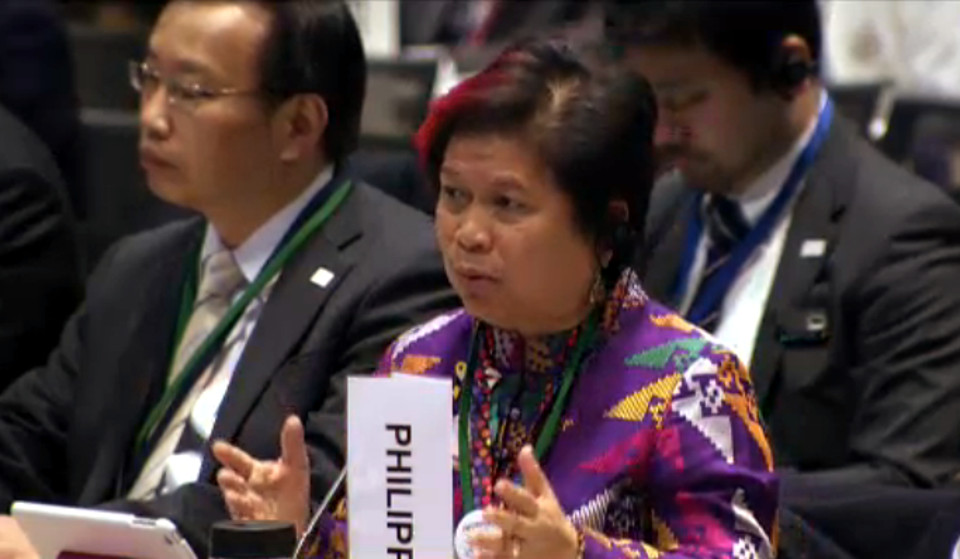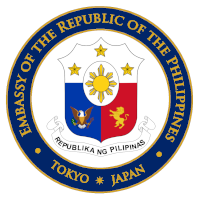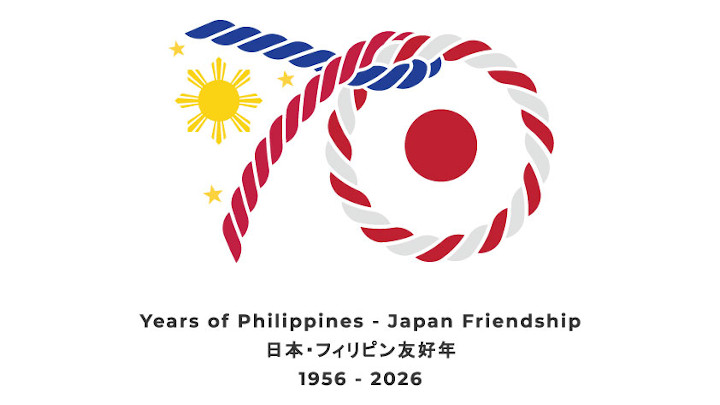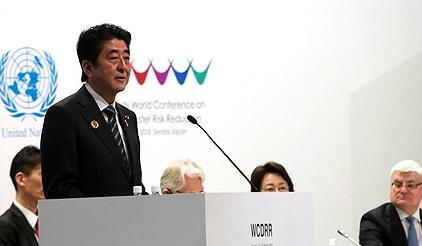Philippine Delegation To 3WCDRR Welcomes Japan’s $4B Fund for DRR, Starts Preparation of Concept Proposal to Access Fund
14 March 2015 –The Philippine Delegation to the 3rd UN World Conference on Disaster Risk Reduction (3WCDRR) welcomes the pledge of Japanese Prime Minister Shinzo Abe of US$ 4 billion to support implementation of the “Sendai Cooperation Initiative for Disaster Risk Reduction” over the next four years.
 Social and Welfare Secretary Corazon “Dinky” Soliman, Head of the Philippine Delegation to the 3WCDRR, lauded and thanked Prime Minister Abe for the fund commitment to enhance disaster risk reduction (DRR) efforts of countries, which will provide opportunities to further enhance Philippine-Japan cooperation on disaster risk reduction, mitigation and management.
Social and Welfare Secretary Corazon “Dinky” Soliman, Head of the Philippine Delegation to the 3WCDRR, lauded and thanked Prime Minister Abe for the fund commitment to enhance disaster risk reduction (DRR) efforts of countries, which will provide opportunities to further enhance Philippine-Japan cooperation on disaster risk reduction, mitigation and management.
The Japanese Prime Minister announced the US$ 4 billion DRR fund in his speech at the opening of the 3WCDRR held at the Sendai Conference Center, Sendai, Miyagi Prefecture. His Majesty Emperor Akihito and H.M. Empress Michiko graced the opening ceremony of the conference to highlight the importance given by Japan to the UN conference and the global effort at DRR.
In announcing the Sendai fund commitment, Prime Minister Abe said: “Disaster risk reduction is the most important challenge for both developed and developing countries. For developing countries in particular, where 90% of disaster victims are concentrated.”
The Sendai package will focus on the development of disaster-proof infrastructure, the promotion of global and regional cooperation and the training of 40,000 government officials and local leaders to play a leading role in national efforts for disaster risk reduction. Japan will make its expertise and knowledge available, the Prime Minister said.
Japan hosted the 3WCDRR in Sendai to share its best practices in DRR following the magnitude 9 Great East Japan or the Tohoku earthquake on 03 March 2011 that triggered a devastating tidal wave causing deaths of some 16,000 people and billions of dollars in damage to public and private infrastructure including homes. The tidal wave inundated the Fukushima Daisha Nuclear Power station resulting in the complete shutdown and eventual decommissioning of the nuclear electricity plant. The Tahoka earthquake and the shutdown of the Fukushima Nuclear power station posed a serious DRR challenge to the Japanese Government. Today, Sendai has achieved great progress in its DRR and management efforts ensuring the protection of the residents and continuity of economic and social activities in the region, an experience Japan wishes to share at the 3WCDRR.
High-level representatives of 186 governments including the Philippines are attending this conference that aims to adopt a new post-2015 framework for DRR on March 18 in place of the current Hyogo Framework for Action adopted ten years ago at the last World Conference on Disaster Risk Reduction held in Kobe, Japan.
Secretary Soliman congratulated Japan for hosting the conference in Sendai and Prime Minister Abe for the primary focus given by his government to the 3WCDRR. The Prime Minister delivered two key note addresses at the conference on 14 March 2015, first at the High Level Multi-Stakeholder Partnership Dialogue Mobilizing Women’s Leadership in Disaster Risk Reduction and second, at the opening ceremony of the 3WCDRR.
Secretary Soliman and Senator Loren Legarda, Alternate Head of the Philippine Delegation, led the delegation of legislators, secretaries, undersecretaries and other high-level Philippine officials during the opening ceremony and at the Dialogue on Women Leadership in DRR.
Congressman Rufus Rodriguez, who is a member of the Philippine Delegation, welcomed the DRR fund commitment of Prime Minister Abe which, he added, will be an opportunity to further improve the disaster preparedness and risk reduction management programs of the Philippines. Congressman Rodriguez recommended to Secretary Soliman that the Philippines start the efforts to access part of the Japan fund for DRR.
In a meeting with the members of the Philippine Delegation following the opening ceremony, Secretary Soliman responded to the recommendation of Congressman Rodriguez and began the task of accessing part of the US$4 B Japan fund for the DRR programs of the Philippines. She suggested to the representatives of the concerned government agencies such as the DOST, DepED, DSWD and NDRRMC to start preparing their concept project proposals and engaging their counterparts in the Japan International Cooperation Agency for assistance in DRR training, technology development, infrastructure especially in the construction of disaster resilient school buildings, empowerment of women in DRR and capacity building for all personnel engaged in disaster relief, mitigation and management.
Secretary Soliman also encouraged the representatives of civil societies present at the delegation meeting to start preparing concept papers or project proposal for capacity building and programs for the empowerment of women and leadership role of women in DRR efforts. END


























